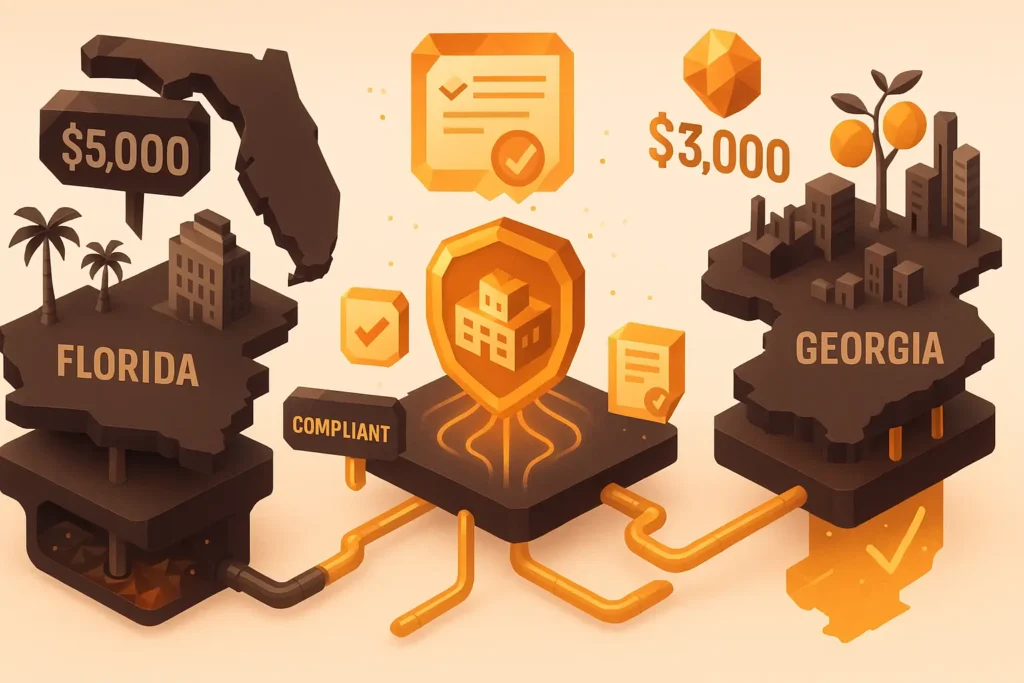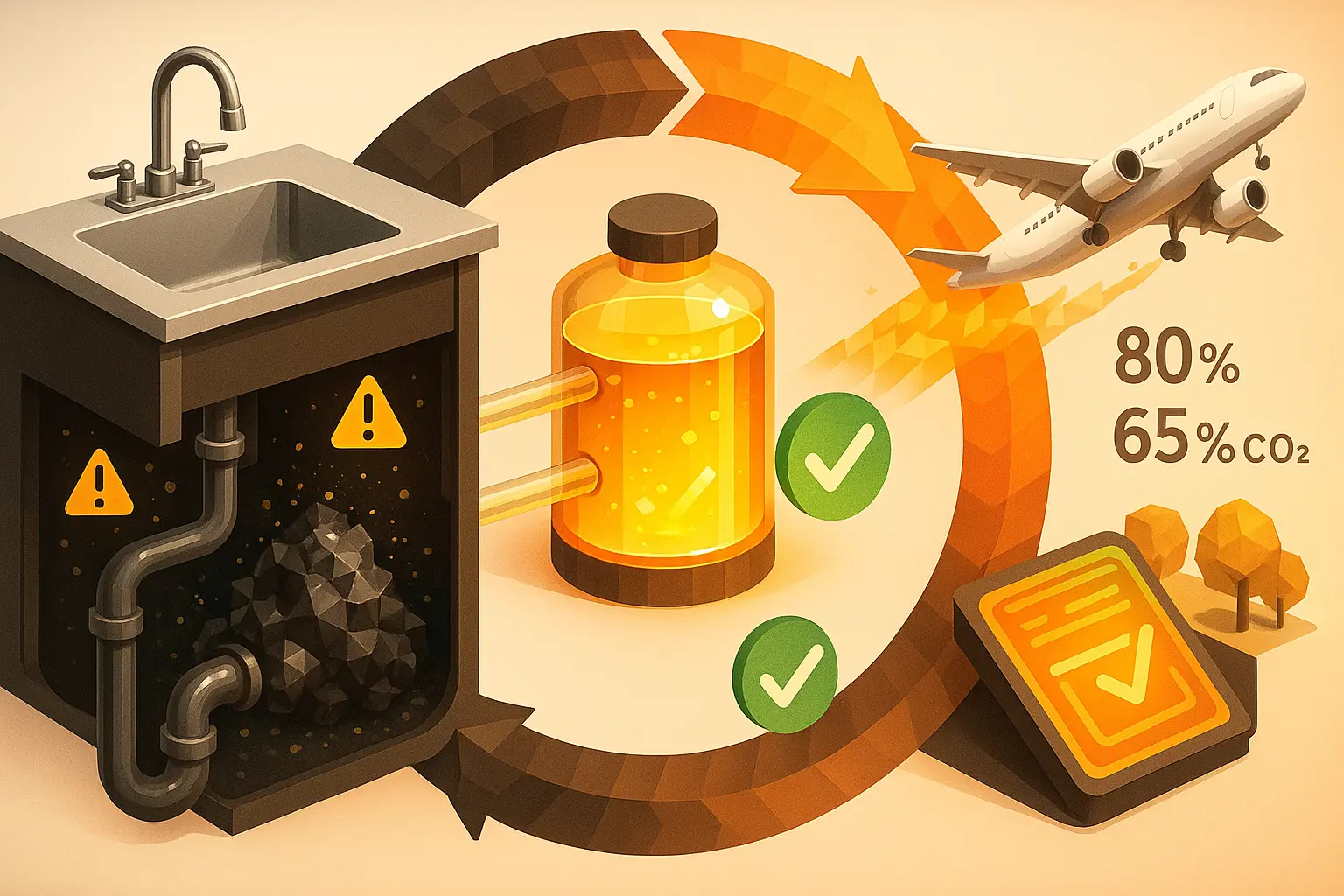Table of Contents
The Cost of Pouring Oil Down the Drain
A single ladle of fryer oil sent down a sink doesn’t vanish: it armors itself to pipe walls, grabs food scraps and wet wipes, and hardens into a fatberg. Grease now triggers almost half of all sewer blockages in the United States, saddling municipalities with about $25 billion a year in cleanup bills.
For restaurants, that same glob means flooded kitchens, emergency plumbers, and bruised online reviews.
The good news: collecting used cooking oil (UCO) for recycling attacks the problem at its greasy root and creates a surprising climate win along the way.

Why Fatbergs Start in Restaurant Kitchens
Heat keeps frying oil liquid only seconds; once it cools in a drain it congeals, then reacts with calcium to form a cement like plug. One mid size restaurant releases 800 to 17 000 pounds of FOG (fats, oils, grease) per year if traps are ignored. Toss in “flushable” wipes and you’ve brewed the monster that shut London’s Whitechapel sewer: a 130 ton fatberg that cost £220 000 to carve out.
Stateside cities fight the same menace daily, from New York’s century old tunnels to newly built lines in Florida. The real culprit is not the sewer: it’s habitual drain dumping and undersized grease traps.
FOG: The Most Expensive Word in Wastewater
When FOG blocks pipes, raw sewage overflows into streets and waterways, dragging pathogens and nutrients that suffocate fish and close beaches. The U.S. EPA reports grease is the single largest cause (47 %) of sanitary sewer overflows. Insurance rarely covers the fallout, and a single commercial backup can top $20 000 to $50 000 in repairs and lost revenue. Proper oil disposal isn’t eco flair: it’s financial risk management.
From Grease Trap to Green Jet Fuel
Collected UCO is filtered, refined and hydro processed into renewable diesel or sustainable aviation fuel (SAF). Neste, the world’s top SAF producer, cuts lifecycle jet fuel emissions by up to 80 % using waste oils like UCO. Airlines from KLM to Air Canada now lock in multi year UCO based SAF contracts as regulators push for 10 % SAF blending by 2030. Your kitchen waste literally keeps planes aloft while slashing their carbon footprint.
Seven Environmental Wins Beyond Carbon
- No more pipe buried fatbergs: UCO collection removes the feedstock before it hardens.
- Cleaner waterways: fewer blockages mean fewer sewage spills and less nutrient pollution.
- Lower methane: oil diverted from landfills avoids anaerobic rot.
- Reduced water treatment energy: plants use less power when FOG loads drop.
- Less soil contamination from surface dumping.
- Circular economy jobs in grease collection and bio refining.
- Energy security: every gallon of UCO SAF displaces imported crude.
| Co Benefit Snapshot | Verified Metric | Source |
|---|---|---|
| Share of U.S. sewer blockages caused by grease | 47 % | EPA |
| Annual municipal FOG related spend | $25 B | Water World |
| Jet fuel carbon cut via UCO SAF | up to 80 % | Neste |
Regulations & Fines That Can Empty Your Cash Drawer
Most cities treat illegal grease dumping as a public health offense. New York City fines up to $10 000 per day for non compliant traps, while Austin, TX levies $2 000 per violation. A single failed inspection can close doors until pipes are cleared and paperwork fixed.
| City | Maximum Daily FOG Fine | Citation |
|---|---|---|
| New York, NY | $10 000 | NYC Gov |
| Miami, FL | $10 000 | DEP |
Tip: Regulations change. Grease Connections advises checking local codes before peak season and keeping digital pump out logs for inspectors.

Setting Up a Compliant UCO Recycling Program
First, choose a licensed used oil collection company that supplies secure, labeled containers. Train staff to cool oil, pour into containers, and never mix water or food scraps: moisture spoils fuel feedstock.
Schedule pickups based on fryer volume; most kitchens do weekly or bi weekly. Keep receipts; they double as proof of proper oil disposal for health inspectors.
Finally, track gallons recycled: those numbers become marketing gold for sustainability minded diners and can unlock city green business rebates. Grease Connections’ customer portal lets you download diversion reports that slot straight into ESG dashboards.
Waste Into Wings: The Circular Future
Demand for SAF is forecast to skyrocket as the U.S. considers a 70 % emissions cut mandate for domestic flights by 2050. The only scalable feedstock today is waste oil: exactly what fills your fryers. By routing UCO to certified recyclers you:
- Keep drains clear and inspectors happy
- Cut hidden plumbing costs
- Give your brand an authentic sustainability story
Grease Connections serves every major market in the United States. Check our Miami Used cooking oil collection link to see pickup schedules and container options tailored to your city.









